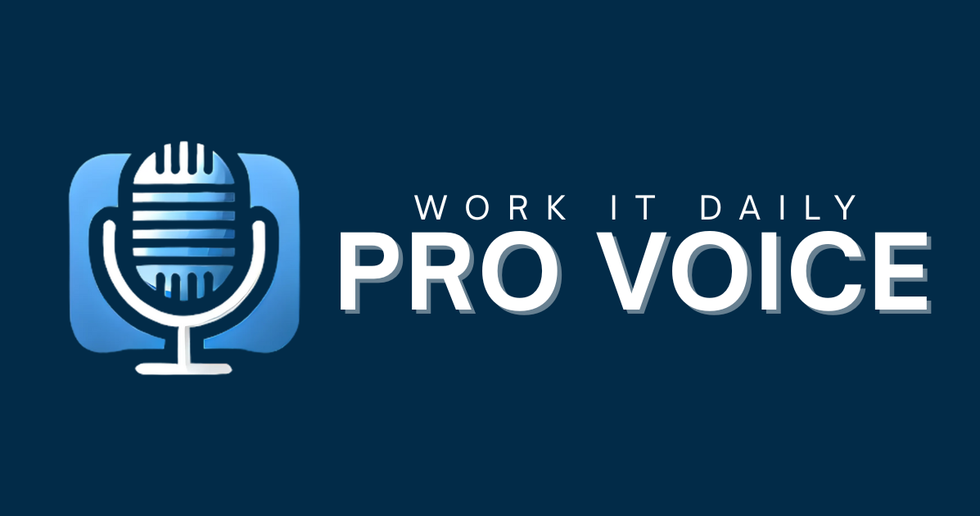
With organizations focusing on AI adoption and integration, an initiative that has the potential to eliminate entire roles, the employees who are left—and the new ones who are hired—become more important than ever. What should leaders know about building future-proof teams that will not only survive the AI revolution in the workplace but thrive?
A company that cares about future-proofing its teams will invest in and zero in on leadership and recruitment best practices. Here are the most valuable takeaways on this subject from members inside Work It DAILY's PRO VOICE program.
When Leadership Decisions Shape the Future
Every decision a leader makes has a ripple effect on future teams and, ultimately, the long-term success of a company.
For example, in startups, every hire counts. Leadership should focus on avoiding failure by hiring at the right time and making sure they don't make the wrong hire at the wrong time. The founder also needs to stay in the mode of wearing many hats, so learning how to properly staff their company is crucial.
The right person in the right place elevates the whole team during periods of growth. This is why hiring smarter helps leaders lead better. Leadership decisions shape culture and drive success, especially when those decisions are centered on recruiting and hiring.
Why Structure Matters in Hiring and Onboarding
 Bigstock
BigstockStructured interviews and onboarding prevent costly hiring mistakes. Small business owners and managers need to hear this more than anyone. A poor process damages first impressions and wastes money, while a structured process helps the company grow and find the right person for the job as quickly as possible, instead of spending all that money on a bad hire.
Simply put, you must set up a structured interview process at your company early on. Too often, job candidates go on an interview, and when they leave, they say, "What the heck was that?"
First impressions matter; therefore, your interview process matters.
Books and Tools Every Modern Leader Should Know
 Bigstock
BigstockAs we mentioned above, hiring smarter unsurprisingly begins with having a structured hiring process to avoid bad hires. But there are other resources and tips leaders should know to help them lead better and build future-proof teams.
- Radical Candor by Kim Scott. This book discusses leading with clarity and humanity. Today's workforce expects leaders to exhibit both humility and humanity, or they simply won't take the job. It is possible to connect with people while challenging them, and this book shows you how.
- Crossing the Chasm (Geoffrey Moore) and Innovator’s Dilemma (Clayton Christensen). These books highlight the importance of alignment and focus in startups. If you have the right alignment in your organization, and everyone's "rowing" in the same direction, you can unlock incredible growth.
How to Balance Speed and Precision in Hiring
 Bigstock
BigstockNow, what type of hiring is better? Fast hiring that gets butts in chairs and keeps things moving, or slow, more intentional hiring that could potentially make a company miss its window?
In reality, it’s not fast or slow—it’s both.
Going back to our point above, structured processes allow companies to move quickly without mistakes. Yet hiring too quickly risks incompetence, which damages leadership credibility.
If you rush and hire the wrong person, you're spending two to three times their annual salary on replacing them. But if you take too long, you're going to lose out on the top candidate that you want for the position. Furthermore, if you bring on an incompetent employee, you'll be viewed as an incompetent leader. So, striking that balance is important in order to build better, future-proof teams that reflect well on your leadership abilities and move the company forward.
Building the Right Team at the Right Stage
 Bigstock
BigstockThe type of person you hire and bring on to your team will change depending on where you're company is at. For example, early-stage startups need utility players who wear many hats because the job is going to change daily. They need people who will jump in and fix the problems that come up every single day.
As companies scale, specialists become essential. However, titles can be dangerous (hello, ego boost), so avoid giving inflated roles (e.g., COO at a 5-person company).
Good leaders guide early employees to new opportunities when companies evolve. Eventually, if you're company grows, there will be specialists working next to the utility players, and as a leader, you need to hire the right player at the right stage and give everyone the opportunity to grow in their roles.
The Evolution of Leadership in a Changing World
 Bigstock
BigstockOf course, one of the biggest elements of building a future-proof team now is AI literacy. And that starts at the top.
Leaders must embrace AI for efficiency—like data-driven hiring and onboarding. You need to utilize it to make your job easier, and so you can get more done. It also frees you up to focus on the things AI can't do, which is to make human connection.
Learning how to balance technology with human connection is crucial. Today's workforce won't tolerate outdated leadership styles, even though we're now seeing a resurgence in the "old way of doing things."
When the world changes, so does leadership, but not in the way we think. Leadership swings like economic cycles, from command-and-control to people-first models. There are great leaders who stay focused on taking care of their people and the customer. And then there are leaders who use buzzword terms to treat people badly. So, while we'd like to say that leadership has matured and evolved past the command-and-control style, it often returns, swinging back and forth like economic cycles.
The important thing is to embrace change—particularly technological change—without forgetting you're a human leading other humans.
Proven Strategies to Build Future-Proof Teams

Ultimately, building future-proof teams is easier than it sounds. Here's what you need to remember:
- Focus, alignment, and transparency create small, responsive, engaged teams.
- Have a structured hiring process to reduce turnover and strengthen morale.
- Practice radical candor—challenge directly while caring personally.
- “The worst behavior you allow is the culture you have.”
- “Be the person that you want to work with.”
- “You perform how you practice.”
- “People hear what they see—actions matter.”
To succeed today, leaders must be visible, strategic, and authentic. Whether through structured hiring, radical candor, or AI-driven leadership, the key is to hire smarter and lead better. That is the foundation of building future-proof teams.
Want to hire smarter and lead better?
With PRO VOICE, you’ll learn how to build alignment, strengthen trust, and future-proof your team—while growing your own professional brand.
- How To Get A New, Better-Paying Job In 2025 ›
- 3 Components Of Executive Presence Every Leader Should Know ›
- 7 Tips For Becoming A Successful Leader At Work ›

 Bigstock
Bigstock Bigstock
Bigstock Bigstock
Bigstock


